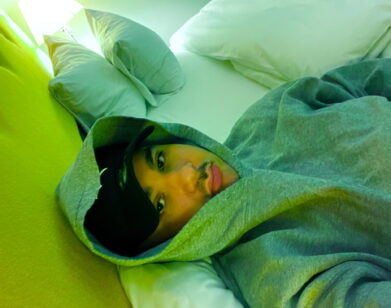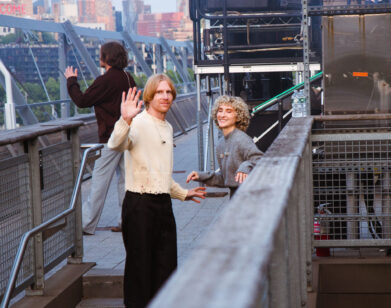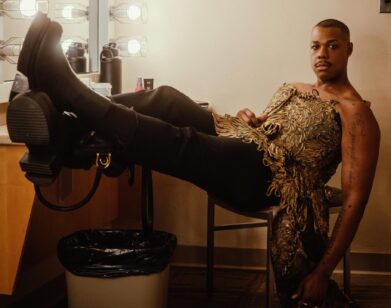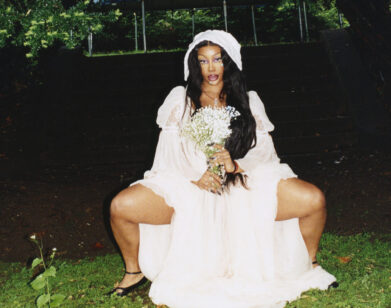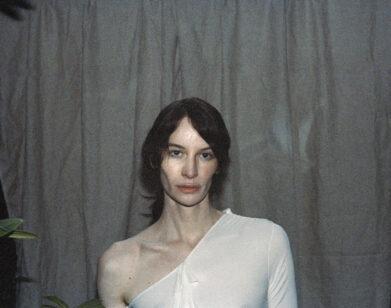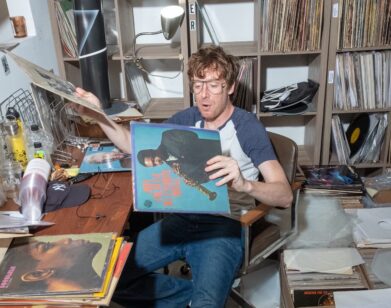Breton Confesses
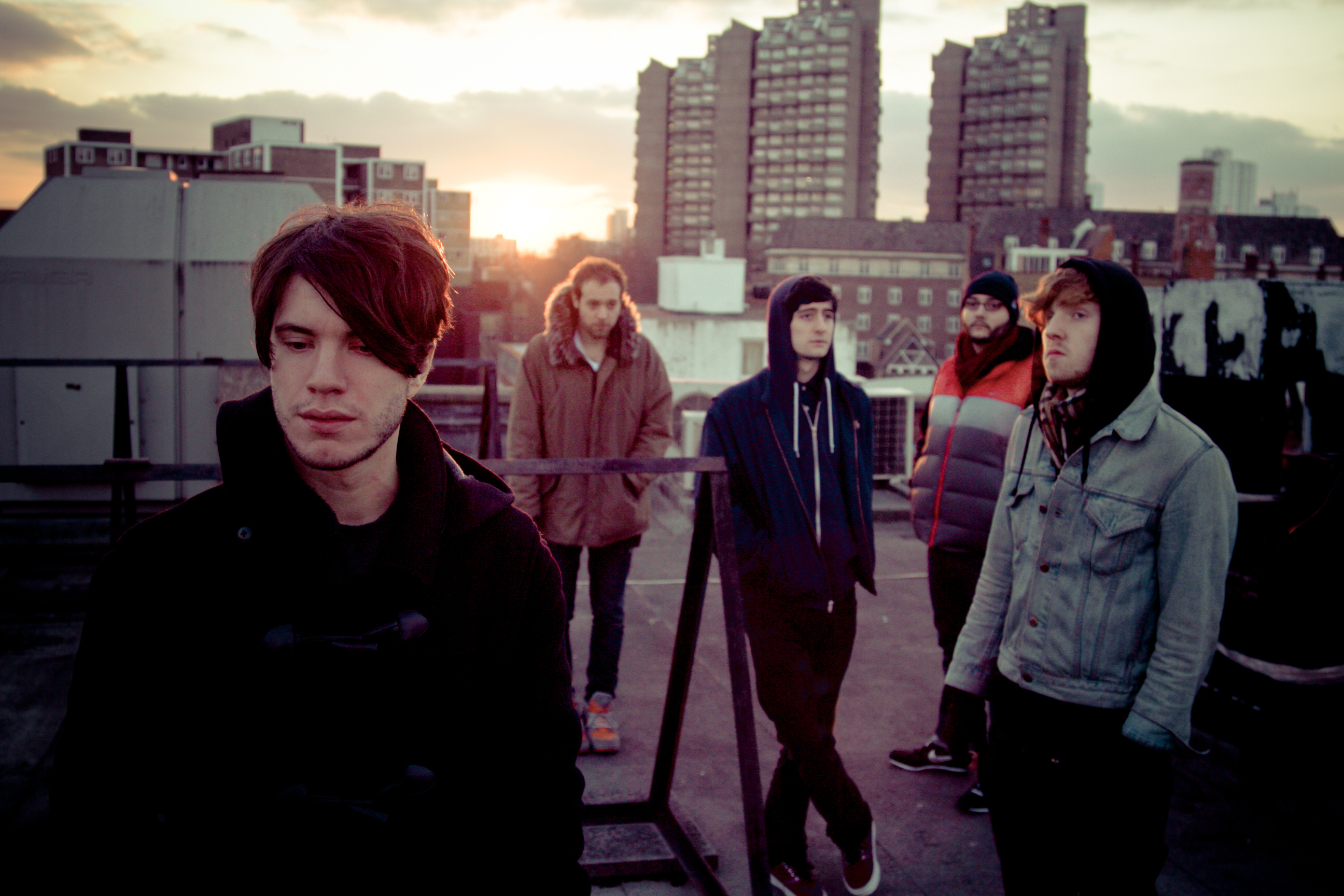
ABOVE: BRETON. PHOTO COURTESY OF JENNA FOXTON.
If the words “multimedia collective” fill you with suspicion, we understand. Anyone who has been around Brooklyn or art school knows to approach such hybrid terms with trepidation. British band Breton, often introduced by this term, however, proved a pleasant surprise.
Originally two hopeful filmmakers—Roman Rappak and Adam Ainger—Breton morphed into a band, or a filmmaking-band, in order to secure better venues to screen their films. Word of mouth spread, and Breton the band developed a following and signed to FatCat records. The now five-member group (Rappak and Ainger joined together with Dan McIlvenny, Ryan McClarnon, and Ian Patterson) is currently touring the US with We Were Promised Jetpacks, but they haven’t given up their cinematic aspirations—far from it, each Breton song on their first full-length album, Other People’s Problems, is accompanied by a short film. Or perhaps each short is accompanied by a song off their album—the aforementioned pleasant surprise is that it’s a little hard to tell, Breton do a pretty great job at both. Interview met a rather sleepy-looking half of the band, Roman and Dan, yesterday. The other half, it seems, was busy setting up for their show that night. “We were nearest the door, the others had just woken up,” explained Roman regarding this unfair deal (who wouldn’t want to chat with Interview?“). “They are wearing more loungey-lounge wear than we are,” added Dan, clad in sweatpants (tracksuit bottoms) and a thrift-store T-shirt. Here, Interview and Breton discuss Orwell, Genghis Khan, reluctant kings, hecklers and Belgium.
EMMA BROWN: How long have you been in the US for?
DANIEL MCILVENNY: [both laugh] 10 days?
ROMAN RAPPAK: Yeah, 10 days. First we got to New York, then we went to Portland.
MCILVENNY: Then we went to Boston.
RAPPAK: We went up to Toronto, we did Montreal, a couple of Ohio dates.
MCILVENNY: We did Ann Arbor, is that Ohio?
RAPPAK: Then we went to Washington [DC]. Then seven minutes ago we arrived in New York. Then you gave us this mango [iced-tea]. It’s been going all right, I think.
BROWN: Do you get time to see any of these cities? Or is it just show to bus?
MCILVENNY: We get time to see a little bit, eat food, have some drinks and see hella loads of venues.
RAPPAK: I have family in Toronto, so I saw them. That was almost a real-life traveling thing to do. It’s weird being the support act. When we were playing headline shows in Europe a while ago, you sound-check really early and you play really late, so you have this chunk of time to go out and get food. You see a lot more of places when you’re headlining. As the support act, you arrive when they’re finishing sound check and there’s a really short amount of time until you go on.
BROWN: Did you know We Were Promised Jetpacks before the tour?
MCILVENNY: We knew of them.
RAPPAK: I’d met the singer. Hopefully we’re mates now. They’re a really tight-knit group because they’ve been touring for years. All of the things we were going through the first week that were a bit heavy—they were [already] five months in. It’s like an army routine. They know exactly what they are doing.
BROWN: What’s the biggest difference between when you are touring in Europe and when you are touring the US? Aside from being a support act in the US…
MCILVENNY: The crowds are definitely different. They are a lot more vocal here. They are vocal in Europe too, but there’s a lot of whooping here.
ROMAN: [laughs] And they all get to the front as soon as the show starts, because they’re curious. The French crowds are like that; lots of European crowds have got different ticks. In Belgium, we sold out this amazing room called the “Botanique.” We got [to the venue]…
MCILVENNY: And everyone started clapping.
RAPPAK: But not making any noises, clapping like a classical audience. We all got on [stage] and it was totally silent. “Hello,” and there was nothing. We played a song and everyone was [very still]. At very end I was like, “Fuck. That went really badly. The sound must be terrible.” But as soon as we stopped [playing] the audience went absolutely nuts. Then they stopped again. It was really disconcerting. I like whooping people.
MCILVENNY: Yeah, wooping’s good.
BROWN: What about angry shouts, do you get those?
RAPPAK: Yeah, when we used to play in London you get horrible, horrible heckles. But I find them quite fun. You’re on a stage and you’re playing music, obviously to people who don’t like your music it’s the most self-indulgent thing in the world: “This is my idea, I’m going to play my idea at you. I’m louder than you. I can’t hear your idea, but you…” I think it’s good if someone heckles you, you have to win them over. You’re there for an audience, you’re not there to be like, “Check out my amazing ideas.”
BROWN: How would you win them over? Just continue what you’re doing and hope for the best, or start directing your performance towards the heckler?
RAPPAK: [laughs] I dunno. Win them over subtly with the music
BROWN: I heard that you started as a multi-media film collective rather than a band. Can you tell me a little bit about how you started and what made you move towards music?
RAPPAK: I was studying film at LCC in London. One of the good things about [their program] is that you get to try a lot of different things—the first year you try scriptwriting, sound design, camera work—everything. I had the opportunity to try these things out, but in the end I focused on sound design. I’ve probably known Adam [Ainger] the longest out of everyone, [Adam and I] made all these short films; some of them were a bit abstract and a bit weird, and some of them were documentaries. We struggled finding a place to screen them. We thought it might be easier if we played the soundtrack live and [then] we could get ourselves booked as a band and hire one of our mates to show the film [at the same time]. It’s really easy to make films now, to put things on YouTube, but you end up watching it on a laptop or crap computers, and the whole idea of cinema and performance is lost. We just thought if we got a piece of cloth, a really cheap projector, and played the soundtrack live, we could show our films in a half-cinema-y way. Then some blogs found out, some fanzines found out about it. We got Ian [Patterson] and Dan involved and started recording, signed with Fat Cat, recorded the album, and came here.
BROWN: So there is a film that accompanies each one of your songs? Even on the your album?
RAPPAK: Yes.
BROWN: How do you begin—with the song, or with the film?
RAPPAK: It varies. Some of the films start with field recording and then the lyrics come from what’s in the field recording, and some of them start from a few piano chords and then get chopped up
BROWN: Are you going to submit your films to any festivals?
RAPPAK: Yeah, we’ve got a documentary were finishing. We’re going to do Sundance and London Short Film Festival and SXSW. The people who curate the London Film Festival want to do a retrospective of all the films we’ve done, the music video.
BROWN: So if Breton started as Roman and Adam, how did you two meet?
MCILVENNY: Through my brother, [and Breton’s manager, Chris].
BROWN: Chris is your brother! I had no idea. Older or younger?
RAPPAK: Younger.
MCILVENNY: Older. I take offence.
RAPPAK: [jokingly] You’ve got [broad] shoulders. You’re the older brother. [laughs]
MCILVENNY: Chris and Roman lived together and they were looking for another person. The rest is history.
BROWN: When you joined the band, Dan, did you join for the music, or for the films, or the combination?
MCILVENNY: For the love of both. It was the most exciting thing that I’d ever had the opportunity to be involved with.
BROWN: I like your song “Edward the Confessor,” but I find Edward a very depressing king. He always looks so miserable in the Bayeux Tapestry.
RAPPAK: Yeah, he’s hugely depressing.
BROWN: I’m very curious to see the video for that song; can you tell me a little bit about it?
RAPPAK: I don’t want to ruin it for you—you have to watch it. I can tell you why we chose Edward the Confessor; it’s about being displaced, being from one country and living in another, or being a stranger somewhere. Edward the Confessor was a king that waited to be king until he was, like, 25. He hid in France, where he was a foreigner, obviously. As the figurehead of Britain, he was the most English thing there is. Eventually there was a coup and Edward went over [to Britain] for two years and then was chased away. That’s sort of the subject of the video and of the lyrics.
BROWN: I always assume that songs are autobiographical even though that’s sort of silly and simplistic. Is “Edward the Confessor” based on an experience you’ve had?
RAPPAK: Yeah, we’re all displaced. [Most of the band] have come down from somewhere else to come to London. My family’s Polish, Canadian, Jewish, German and Latvian. I [grew up in London] but went to a French school. I was there as an English person, but then when I left, I went to an English school and everyone was like, “‘You’re not English. You’ve got a foreign-sounding name and you speak French.” So I’ve kind of always felt like a little bit of a stranger.
BROWN: Do you have a favorite historical figure or figure you admire, excluding Edward the Confessor?
RAPPAK: [laughs] I feel sorry for Edward the Confessor, I don’t know that I admire him.
MCILVENNY: I’d really like to meet Genghis Khan. He managed to have a huge empire, a single-body empire. I think that’s quite a feat. Plus one in 20 people are descended from him apparently or some ridiculous stat. like that-to do with the genetics and the pillaging he did.
RAPPAK: [laughs]
BROWN: Have you seen Bill and Ted’s Excellent Adventures?
RAPPAK: I’ve only seen the second one.
BROWN: Genghis Khan is in the first one. It took me about 15 years to think of Genghis Khan as not…
RAPPAK: Not the dude in Bill and Ted? [laughs] George Orwell was a pretty interesting guy. Historical doesn’t have to be…
BROWN: No, it doesn’t have to be a military general. Just dead.
RAPPAK: George Orwell’s amazing. I think as a writer he did a bit of a Gonzo approach to writing: he lived in it for a while, researched it in a really profound way.
BROWN: Have you ever heard of the “Proust Questionnaire”? Or read Vanity Fair.
RAPPAK: No, have you Dan?
MCILVENNY: [incredulously] Vanity Fair?
BROWN: I’m going to ask you a question from the Proust Questionnaire: “If not yourself, whom would you be?”
DAN: Anyone in the world?
RAPPAK: Do they have to be alive? That is a pretty psychedelic question. I reckon I’d like to be Paul Merton. He’s a massively depressed comedian, who’s so instinctively funny. It’s that kind of humor—it’s not like he knows how to make a good joke or do puns, he just sees the entire world back to front, and all of his jokes are bridging two surreal aspects of life that you realize are part of everyday life.
MCILVENNY: That’s a good one.
RAPPAK: It would be better than being rich, better than being anything. You’d just go somewhere are everyone would be in stitches. It’s like a power.
MCILVENNY: Super power.
BROWN: But then everyone would always want you to make them laugh.
RAPPAK: That’s the thing. Maybe that’s the real beauty of it; there’s that sort of miserable aspect to it—there’s something really heroic, you make everyone laugh because you’ve got this crushing sense of self-doubt.
BRETON ARE PLAYING TONIGHT AT THE MUSIC HALL OF WILLIAMSBURG. FOR MORE INFORMATION, VISIT THEIR FACEBOOK PAGE.

